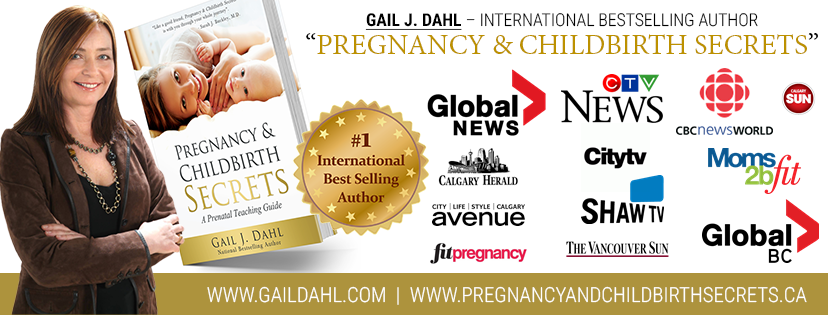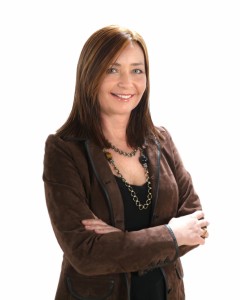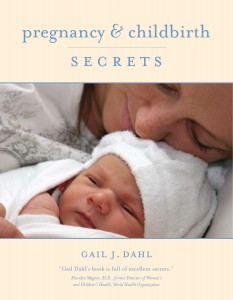Secrets – Childbirth Education in the Classroom
The Canadian Childbirth Association is requesting community support from university faculty members, teachers, physicians, midwives, childbirth professionals, nurses, doulas, students, mothers and grandparents to support childbirth education in the classroom across Canada and the United States. Please email your comments of support and forward this message on.
The Canadian Childbirth Association would like your support for childbirth education in the classroom. If you would like to see pregnancy and childbirth information provided for our young women and men starting from Grade 4 and continuing to Grade 12 in our public school system, please comment below. Thanks for your support and for helping us make this important health information available.
Many thanks, Gail J. Dahl, Award Winning, National Bestselling Author, “Pregnancy & Childbirth Secrets”, Founder and Executive Director of The Canadian Childbirth Association
Thanks for all of the wonderful letters of support sent in already. Here is a sample of some of your comments and support received so far that have been forwarded to the school boards who have requested community support:
Hi Gail, I really like getting your “secrets”. I would love to see childbirth education introduced into middle and high school health classes! I’m glad to be informed of the progress.
Warmly,
Ellen Derby CD(DONA) CLC LMT
315-462-3394
http://www.birthandmothersmilk.com
We birth the way we live. Educating our youth about birth and the role it plays in our lives is a powerful way of preparing women and men for parenthood and the opportunity and challenges this creates in our lives. Age appropriate information will help overcome the fear and incorrect information that our culture and the media puts forth. Our perceptions and beliefs about childbirth that we form at an early age will have an impact on how we approach pregnancy and birth and thus on the health and well being of the next generation. I strongly support The Canadian Childbirth Association to provide education to young women and men starting in Grade 4 – 12th. This is where the seeds of knowledge of the power and possibilities about birth and women’s bodies and abilities should begin.
Debra Pascali-Bonaro, LCCE, CD(DONA), PCD(DONA)
http://www.motherlovedoulas.com
Chair International MotherBaby Childbirth Initiative, http://www.imbci.org
DONA International Doula/ Doula Trainer
Lamaze International Childbirth Educator
Join the discussion http://www.facebook.com/obirth
http://www.organicbirthmovie.com
As a birth doula who serves mostly women of higher socioeconomic backgrounds in the U.S., I find it very frustrating that most women do not give a moment’s thought to giving birth until they become pregnant. By that point, many years of (often inaccurate) portrayals of birth in the media have already shaped a woman’s perception of birth. Sometimes, women come to realize only after their first children are born how their own beliefs and actions can influence the way they give birth. I would love to see birth become an accepted part of a curriculum for both girls AND boys, thus providing both a more realistic picture of birth and also enabling women (and men) to make choices about the births of their children. I hope Gail is successful in Canada and would love to see the cause taken up in the U.S. as well.
Audrey Kalman CD(DONA)
Certified Birth Doula, Educator, and Lactation Counselor
http://www.peninsulabirthcompanions.com
It’s a “No Brainer” and just simply makes GOOD sense to educate young people about sex, pregnancy, birth, circumcision and parenting before they have to make choices or assumptions about those things in those unplanned situations where they make choices based on external circumstance – which is really no good for our society.
One of my passions, that stem from my passion in midwifery, is to give talks to junior high and senior high students about such things. I believe it is very important!
Thanks for asking.
Lonnie Drury HBE
I would love to see and be a part of this! I have been invited to teach on the topic many times for high schools as a special topic. I spent three years teaching Sex Education before becoming a Doula and CBE. I really miss the teen audiences!
Lisa Wass B.Ed,
Certified Labour Doula Trainer for CAPPA
Student Midwife
Prenatal Educator
Basic childbirth, and best practices parenting and child development information should be a mandatory part of every child’s education.
Judy Arnall, Speaker and Author
Parenting Speaker, Trainer and Bestselling Author
NEW DVD! Plugged-In Parenting: Connecting with the Digital Generation for Health, Safety and Love
Order your copy today!
http://www.professionalparenting.ca
403-714-6766
I would very much like to see this information provided in schools, starting in grade 4 would be excellent. As a grandmother, I grew up in the age where sex was never discussed. I raised my five children the same way. They had to find out about their bodies the hard way. Today, there is still denial and shame in homes, children are not taught how to respect their own bodies, and how to understand the language of sex. Therefore,sex education in schools at an early age is necessary as most parents are not equipped to handle this subject.
Jollean Sandwell Schantz, Grandmother
Yes, as we can see the children are not getting the info needed as there are so many pregnancies with teenagers. I was very surprised to see daycares in high schools. Good for the Moms and Babies but hopefully something could be done so that would not be necessary. Also so many STDs and if they have to info they will know how to avoid getting and what to do if it happens.
Thank you,
Kathy Dahl, Mother
So many of our young clients have had no-one in their lives to guide or direct them about sexuality / childbirth issues. I support the childbirth educators and their team in their endeavors to promote this crucial health information.
Alice Williams, Midwife
RE: THE IMPORTANCE OF CHILDBIRTH AND FAMILY STUDIES EDUCATION INCLUDED FOR K TO GRADE 12 STUDENTS CLASSES
BY HILDA H. DAHL, BHE, MEd, RESEARCHER, AUTHOR
“Family studies supports childbirth education as one part of the umbrella focus. The homeless women I am meeting are now saying at their mid-twenties to fifties the following: We wish we would have studied harder in our junior and senior high school classes as they did not have the family, childbirth skills and information they needed. Their children were put into foster homes soon after birth, they didn’t have enough economic wealth to survive as single parents.
A pilot Women’s Studies course also had elements of childbirth education and family studies in Victoria BC. The homeless women also expressed their loss of not being able to have studied this information in their high school years. Educate a woman, a mother, a daughter, a grandmother and great aunt and we can educate the generations to come in the future, for sure. Women carry and nurture our boys and girl babies to the next generation on and on and on!!
To summarize, we all need to become more involved in our past, present and futures as relates to our population. Children need guidance at all levels of their growing up times so that a balance is maintained that they do not fall into sexual experiences before they can cope with the parental consequences. A lack of feminine input needs to addressed so that the economics fosters opportunities for dual male and female input into how our collective future is played out successfully in every way.”



